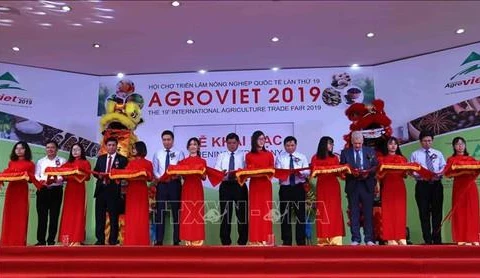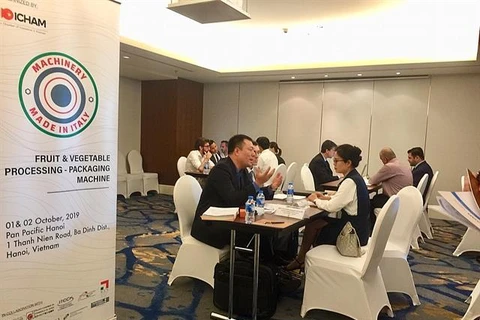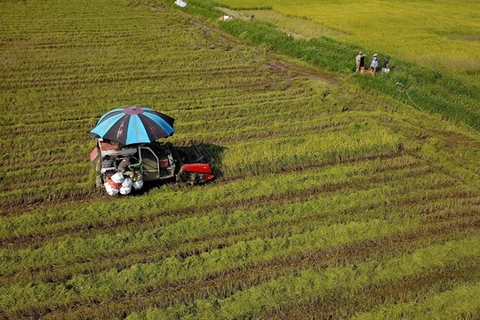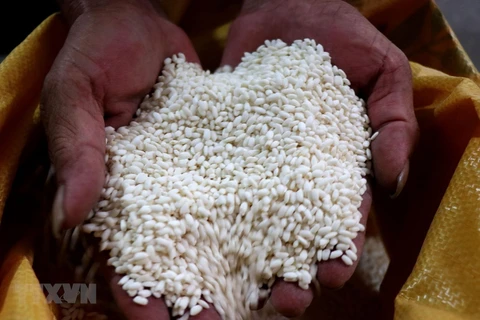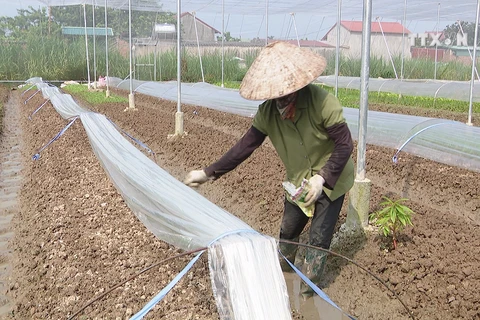 World Bank Country Director for Vietnam Ousmane Dione addresses the meeting in Hanoi on December 5 (Photo: VNA)
World Bank Country Director for Vietnam Ousmane Dione addresses the meeting in Hanoi on December 5 (Photo: VNA) Hanoi (VNA) – The Ministry of Agriculture and Rural Development (MARD) held a meeting in Hanoi on December 5 to discuss ways to sustainably develop raw material areas and improve processing capacity and market access for agro-products of Vietnam.
MARD Minister Nguyen Xuan Cuong said though the agricultural sector of Vietnam has obtained major achievements, it cannot rest on its laurels due to three challenges, which are the small production scale, climate change impacts and economic integration into the world.
He admitted that the country has good agricultural production capacity but the production remains ineffective due to the small scale. Besides, deep processing has just developed for only some commodities like shrimp, tra fish and milk to create products with higher added value. Most of other agricultural products have very short value chains.
Vietnamese farm produce have entered 180 markets with total export revenue of over 40 billion USD each year. However, the country has only done a good job in opening new markets while market exploitation and development efforts are still modest, the official noted.
Echoing the view, World Bank Country Director for Vietnam Ousmane Dione said there remain concerns about the quality and sustainability of the country’s agricultural growth, pointing out the low profit for smallholders, a lack of strong connection between product quality and food safety, big post-harvest losses, and limited innovation.
He recommended Vietnam consolidate the connectivity among the main factors in agricultural development, boost cooperation in production planning among provinces, and increase trade promotion.
According to Minister Cuong, to address those shortcomings, it is a must to boost agricultural restructuring with a focus on enhancing concentrated production, developing commodities of Vietnam’s strength, applying scientific advances, and re-organising production.
Dang Kim Son, former Director of the Institute of Policy and Strategy for Agriculture and Rural Development, said raw material areas are the starting point and the foundation of agricultural value chains, noting that the successful formation of these areas will be the prerequisite for handling other stages in value chains.
Sharing their experience in forming raw material areas, a representative of the UN Industrial Development Organisation (UNIDO) said they chose small- and medium-sized private companies located in the core zones of raw material areas so as to cut down intermediary steps, reduce the cost of risk, and better monitor input materials.
UNIDO has successfully applied this model to building chains for mango in the Mekong Delta and for vegetables in the northern mountainous region, the representative said, noting that one of the first two businesses licensed to export mango to the US is involved in this model.
At the meeting, the MARD and UNIDO signed an agreement to implement a project on improving the quality and the adherence to quality standards of mango value chains in the Mekong Delta./.
VNA
